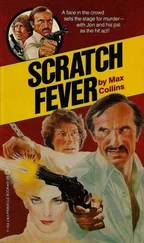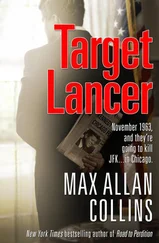Max Collins - Majic Man
Здесь есть возможность читать онлайн «Max Collins - Majic Man» весь текст электронной книги совершенно бесплатно (целиком полную версию без сокращений). В некоторых случаях можно слушать аудио, скачать через торрент в формате fb2 и присутствует краткое содержание. Жанр: Криминальный детектив, на английском языке. Описание произведения, (предисловие) а так же отзывы посетителей доступны на портале библиотеки ЛибКат.
- Название:Majic Man
- Автор:
- Жанр:
- Год:неизвестен
- ISBN:нет данных
- Рейтинг книги:4 / 5. Голосов: 1
-
Избранное:Добавить в избранное
- Отзывы:
-
Ваша оценка:
- 80
- 1
- 2
- 3
- 4
- 5
Majic Man: краткое содержание, описание и аннотация
Предлагаем к чтению аннотацию, описание, краткое содержание или предисловие (зависит от того, что написал сам автор книги «Majic Man»). Если вы не нашли необходимую информацию о книге — напишите в комментариях, мы постараемся отыскать её.
Majic Man — читать онлайн бесплатно полную книгу (весь текст) целиком
Ниже представлен текст книги, разбитый по страницам. Система сохранения места последней прочитанной страницы, позволяет с удобством читать онлайн бесплатно книгу «Majic Man», без необходимости каждый раз заново искать на чём Вы остановились. Поставьте закладку, и сможете в любой момент перейти на страницу, на которой закончили чтение.
Интервал:
Закладка:
I liked Jim Forrestal, and as was the case with Pearson, the guy was a dedicated servant of the public who did a lot of good, particularly toward the winning of the Second World War; but there would have perhaps been better things to bequeath the nation he loved and served than Nazi collaboration, the Cold War and McCarthyism.
Caught up in the pressures of McCarthyism, his popularity eroded, Harry Truman left office largely unheralded, though with his position in history secure as the first (and at this writing only) U.S. president to use the atomic bomb in war; historians rate him a good to great president, a perception that had long since become evident by his death in 1972.
Teddy Kollek-who had fled to Canada from U.S. prosecution in April of 1949-was elected Mayor of Jerusalem in 1965, a position he held for twenty-eight years; much of the face of modern Jerusalem, it has been said, is his doing. His efforts toward tolerance for minority groups in his city, including Arabs, alienated some of his constituents, and his last two mayoral campaigns failed, despite efforts by such Hollywood supporters as his old friend Frank Sinatra. In 1991 he established the Jerusalem Foundation to help further aesthetic and cultural development of his beloved city.
Jo Forrestal was in and out of clinics for the rest of her life, for alcoholism and mental problems. In the first years after her husband’s passing, she traveled constantly, and lived for a time in France, Ireland and Jamaica, finally landing in Newport, Rhode Island, selling Morris House in 1951. She also maintained an apartment on Park Avenue in New York, and backed several theatrical productions in Newport as well as writing a play of her own, Democracy, never produced. Sporadic reports of her bizarre behavior continued until her death in January of 1976.
The Forrestals’ son Michael distinguished himself with service in the Kennedy White House, returning to law practice after the assassination; his life was devoted to improving understanding between the United States and the Soviet Union. Unmarried, he died of an aneurysm in January 1989, at sixty-one; he was chairing a committee of the governing board of Lincoln Center, at the time. Brother Peter worked for his father’s old firm, Dillon, Read, then for Ferdinand Eberstadt’s company (Eberstadt died in 1969, leaving a personal estate of fifty million). Peter shared his mother’s love of and skill with horses, but also shared her love for, and lack of skill with, alcohol. He died at fifty-two of an abdominal hemorrhage due to heavy drinking, leaving behind a bride of a year, pregnant with a daughter he never knew.
Many of those I met on the Forrestal/Roswell job are gone-including two class acts of law enforcement, Frank J. Wilson and Hughie Baughman-and others I never saw again and couldn’t tell you what became of them, like the two medical corpsmen, Prise and Harrison, and the doctor who tore his sleeve, Deen.
But Roswell … that was another story.
For many years, the incident at Roswell-despite the historical significance of the Air Force issuing a press release announcing the recovery of a flying saucer-rarely received even a mention in the voluminous UFO literature of the late forties and on through the seventies.
But in 1978, Stanton Friedman-a nuclear physicist with an interest in UFOs-followed up a lead that led him to Lieutenant Colonel Jesse Marcel, retired, who had spent his post-military years running a television repair shop in Houma, Louisiana. Marcel told Friedman the same story he’d told me back in 1949-a story he had apparently told no one since-and a Roswell floodgate opened.
A cottage industry of books by Friedman and others blossomed, with scads of television documentaries, in which Marcel and other witnesses-like Glenn Dennis, Walter Haut, Frank Joyce and Frank Kaufmann-came forward, becoming celebrities in UFO circles, even television stars, with the many appearances they made. Marcel’s son, a physician and pilot, with memories of the samples of strange “saucer” debris his father had brought home in ’47, joined in with his own recollections, taking over as family TV spokesman after his father’s death in 1986. These were solid citizens, clearly not kooks, and their reminiscences carried weight.
Some potential Roswell witnesses, however, received their fifteen minutes of fame posthumously.
Mac Brazel died in 1963, though relatives and neighbors told his story to researchers and on camera. His son Bill Brazel reported his father had been held by the Air Force for eight days in the base “guesthouse.”
Colonel William “Butch” Blanchard remained tight-lipped on the subject of Roswell, in public at least, though friends reported he’d said, when asked about the supposed saucer, “I’ll tell you this, what I saw I’d never seen before.” Shortly after the incident, he was promoted to general and, at the time of his death in 1966, was Deputy Chief of Staff of the Air Force.
Sheriff George Wilcox did not run for reelection and his family considered the saucer incident to have gravely affected his health and outlook. Wilcox passed away before the renewed interest in the saucer crash; but family members, including his wife, Inez, came forward with tales of death threats from the military.
The daughter of fireman Dan Dwyer, Frankie Rowe, told of the strange debris, scraps of which she had handled, and claimed that her father (part of a fire department crew called to the crash site) had described “aliens” being loaded into body bags. She also tearfully recounted death threats to her father and herself by sinister figures from the government.
The resurgence of Roswell interest caused the Air Force to do something remarkable: they contradicted their previous explanation of the debris found on the Foster ranch with a thick official report in 1994, admitting the weather balloon story had been a cover-up for Project Mogul-which in 1947 had been classified Top Secret A-1. This-the third official explanation (first a flying disk, then a weather balloon, now Project Mogul)-was the intelligence-gathering balloon train described to me by Frank Wilson in 1949. An experimental attempt to acoustically detect suspected Soviet atomic explosions and missile launchings, Mogul utilized acoustical sensors, radar reflecting targets and other gizmos, all of which were attached to a train of weather balloons over six hundred feet long.
The flaw in this explanation-which I’ve never heard anybody point out, including the “UFOlogists”-is that Project Mogul would be the very device gathering information for Major Jesse Marcel at SAC in 1948 and ’49. Unless Marcel was part of a decades-spanning disinformation campaign-which seems very unlikely, considering his burst of UFO TV fame in his elderly years-this indicates Marcel, in the new job he’d been transferred to from Roswell, would have likely discovered that the strange debris he’d found in ’47 was from one of the devices gathering information for him in ’48. And he would not have spoken to me in 1949, nor a horde of Roswell researchers in the late seventies and early eighties, from the point of view of a man still bewildered by what he’d found on the Foster ranch.
The Project Mogul explanation, of course, didn’t speak to the many witnesses-Frank Kaufmann, Glenn Dennis and a number of others who came out of the woodwork in the eighties and thereafter-who spoke of the second crash site, the wedge-like aircraft and the alien crew.
So the Air Force rolled up its sleeves for a fourth official explanation. In 1997, in perhaps the most tortuous piece of logic to arise out of Roswell yet, the Air Force explained that the alien bodies that had been seen by witnesses in 1947 were crash-test dummies dropped by the USAF starting around 1952. Seems the residents of Roswell were simply confused about the time frame.
Читать дальшеИнтервал:
Закладка:
Похожие книги на «Majic Man»
Представляем Вашему вниманию похожие книги на «Majic Man» списком для выбора. Мы отобрали схожую по названию и смыслу литературу в надежде предоставить читателям больше вариантов отыскать новые, интересные, ещё непрочитанные произведения.
Обсуждение, отзывы о книге «Majic Man» и просто собственные мнения читателей. Оставьте ваши комментарии, напишите, что Вы думаете о произведении, его смысле или главных героях. Укажите что конкретно понравилось, а что нет, и почему Вы так считаете.












